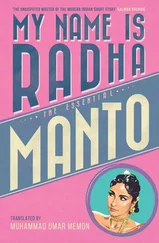Her mother was in a panic. Kishori sat waiting in the room; the men he’d brought — as promised, two rich men, with a motor car — waited in the main market; but where had her daughter vanished to? She couldn’t even use the excuse of dysentery anymore; she was well now. And rich men with motor cars didn’t come every day. It was Kishori’s benevolence that once or twice a month, he managed to bring clients with motor cars. Normally he was nervous of neighbourhoods like this, with their compound stench of paan and stale bidis. How could he bring rich men here? But because he was smart, Kishori never brought the men to the chawl. Instead, he brought Sarita, bathed and clothed, to them, explaining that ‘these are uncertain times; the place is crawling with police spies; they’ve taken away nearly a hundred working girls; there’s even a case against me in the courts; one has to tread very carefully.’
Sarita’s mother had by now become very angry. When she came down, Ramdi was sitting at the bottom of the stairs, cutting leaves for the bidis as usual. ‘Have you seen Sarita anywhere?’ Sarita’s mother demanded, ‘God knows which hole she’s gone and died in. And today of all days! Wait till I find her! I’ll give her a thrashing she’ll remember in every joint of her body. She’s a full grown woman, you know, and all she ever does is waste the day fooling around with kids.’
Ramdi said nothing and continued to cut the bidi leaves. But Sarita’s mother wasn’t really speaking to her; she was just ranting as usual as she walked past. Every few days, she would go off in search of Sarita, and repeat the same words to Ramdi.
Sarita’s mother would also tell the chawl’s women that she wanted Sarita to marry a clerk some day. This was why she had always impressed upon Sarita the importance of education. The municipality had opened a school nearby and Sarita’s mother wondered if she should admit her daughter there. ‘Sister, you know, her father had such a desire that his daughter should be educated!’ At this point she would sigh, and repeat the story of her dead husband, which every woman in the chawl knew by heart. If you were to say to Ramdi, ‘Alright, when Sarita’s father worked in the railways and the big sahib insulted him, what happened?’ she would immediately reply, ‘Sarita’s father foamed at the mouth and said to the sahib, “I’m not your servant; I’m the government’s servant. You have no right to throw your weight round here. And careful — you insult me again and I’ll rip your jaws out and shove them down your throat.” Then, what? What was bound to happen happened! The sahib was livid and insulted Sarita’s father again. Sarita’s father came forward and delivered such a powerful blow to the sahib’s neck that his hat flew off his head and landed ten paces away and he saw stars in the daytime! But the sahib was not a small man either. He retaliated by kicking Sarita’s father on the back with his army boot, and with such force that his spleen burst, and there and then, by the railway lines, he fell to the floor and breathed his last. The government ran a court case against the sahib and extracted a full five hundred rupees in compensation from him for Sarita’s mother. But her luck was bad. She developed a taste for the lottery, and within five months, she had squandered the money.’
This story was always ready on Sarita’s mother’s lips, but nobody was sure whether or not it was true. In any case, it didn’t evoke any compassion for her in the chawl, perhaps because everyone there was also deserving of compassion. And no one was anyone’s friend. The men, by and large, slept during the day and were awake at night as many worked the night shift at the nearby mill. They lived together, but they showed no interest in each other’s lives.
In the chawl, virtually everyone knew that Sarita’s mother had sent her young daughter into prostitution. But since these were people who treated each other neither well nor badly, they felt no need to expose her when she’d say, ‘My daughter knows nothing of this world.’
One morning, when Tukaram made an advance on Sarita, her mother began to screech and yell, ‘For God’s sake, why doesn’t anyone control this wretched baldy? May the lord make him blind in both the eyes with which he ogles my virgin daughter! I swear, one day, there’ll be such a brawl that I’ll take this darling of yours and beat his head to a pulp with the heel of my shoe. Outside, he can do whatever he wants, but in here he’d better learn to behave like a decent human being, do you hear?’
Hearing this, Tukaram’s cross-eyed wife appeared, knotting her dhoti as she approached. ‘You wretched witch, don’t you dare let one more word escape your lips! This virginal daughter of yours even makes eyes at the boys who hang around the hotel… Do you think we’re all blind? You think we don’t know of the clerks who come to your house? This daughter of yours, Sarita, why does she get all made up and go out? You really have some nerve, coming in here with airs of respectability. Go get lost, somewhere far away, go on!’
There were many well-known stories about Tukaram’s cross-eyed wife. Everyone knew that when the kerosene oil dealer would come with his kerosene, she would take him into her quarter and lock the door. Sarita’s mother loved to draw attention to this. In a voice brimming with hatred, she would repeat, ‘And your lover, the kerosene oil dealer… Two hours at a time, you keep him locked up in your quarter, what are you doing? Sniffing his kerosene oil?’
The spats between Tukaram’s wife and Sarita’s mother never lasted long because one night Sarita’s mother had caught her neighbour exchanging sweet nothings with someone in pitch darkness. And the very next night, Tukaram’s wife had seen Sarita with a ‘gentleman man’ in a motor car. As a result, the two women had made a pact between themselves, which is why Sarita’s mother now said to Tukaram’s wife, ‘Have you seen Sarita anywhere?’
Tukaram wife’s turned her squinting eye in the direction of the street corner, ‘There, near the dump. She’s playing with the manager’s girls.’ Then in a lower voice, she added, ‘Kishori’s just gone upstairs. Did you see him?’
Sarita’s mother looked around her and in a still lower voice said, ‘He’s sitting inside… But Sarita’s never to be found at such times. She doesn’t think, she understands nothing, all she does is spend the day running around.’ With this, Sarita’s mother walked towards the dump. Sarita jumped up when she saw her mother approaching the cemented urinal, the laughter leaving her eyes… Her mother grabbed her arm roughly and said, ‘Come on, come into the house, come in and die… Do you have nothing better to do than play these rowdy games?’ On the way in, in a softer voice, she said, ‘Kishori’s here. He’s been waiting a long time. He’s brought men with motor cars. Go on, run upstairs and get dressed. And wear that blue georgette sari of yours. Oh and listen, your hair’s a terrible mess, get dressed quickly and I’ll come up and comb it.’
Sarita was very happy to hear that rich men with motor cars had come for her, granted she was more interested in the motor cars than in the rich men who drove them. She loved riding in motor cars. When the car would roar down the open streets and the wind would slap her face, then everything would become a whirlwind and she would feel like a tornado tearing down empty streets.
Sarita was no older than fifteen, but with the interests of a girl of thirteen. She didn’t like spending time with grown women at all. Her entire day was taken up, playing silly games with the younger girls. They liked especially to draw chalk lines on the street’s black tar surface, and remained so absorbed in this game that one might almost believe that the street’s traffic depended on them drawing their crooked little lines. Sometimes Sarita would bring out old pieces of sackcloth from her room. And for hours she and her young friends, would remain immersed in the singularly monotonous business of dusting them and laying them out on the footpath to sit on.
Читать дальше












